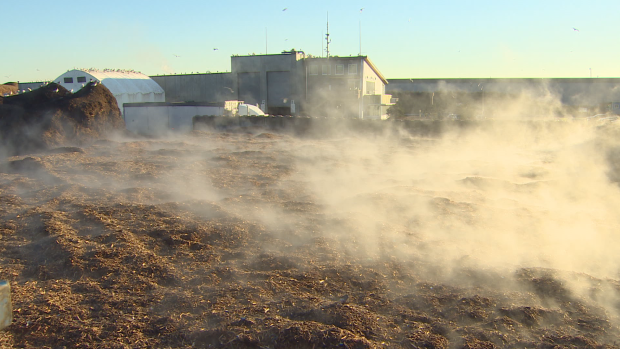A persistent stench hanging over Richmond has now prompted some residents into more organized action against Harvest Power, the compost company responsible for the sour, gag-inducing odour.
Local realtor Arnold Shuchat has created an online petition and Facebook group (Stop the Stink in Richmond) calling on residents to share their concerns, appeal a recent permit to Harvest Power and ask the composting company to give immediate assurances that its foul odours will cease.
Shuchat is concerned people have few reasonable avenues to file complaints and be informed about the progress of a four-year air quality permit issued Sept. 30 to Harvest Fraser Richmond Organics Ltd. by the Metro Vancouver regional government.
“It sounds like people are lodging complaints and no one cares. There’s a lot of skepticism that nothing is being done,” said Shuchat.
The Richmond resident of 23 years believes the odours may be grounds for a class-action lawsuit by residents, under nuisance laws. And if the stink persists, it could have long-term consequences on health and property values, he said.
His Change.org petition, titled ‘Stop the Stink in Richmond,’ reads: “We are concerned for our health and personal safety, our diminished enjoyment of our ‘Island by the Sea’ environment, and the value of our properties, which are likely to be diminished over time by the disgusting smell in the air as a result of the operation of Harvest Fraser Richmond Organics Ltd., which to date has failed to operate in a way so as to prevent nuisance damages to its neighbours.”
Speaking to the Richmond News, Schuchat put his concerns more plainly: “If someone took a turd on your lawn every day and the wind blew your way, it’s a nuisance,” said Shuchat.
Resident John Bradford said he is particularly concerned about the health implications of the new permit that allows for a seven-fold increase in the amount of volatile organic compounds (VOCs) that can be emitted from the facility, compared to the previous permit.
According to the permit, people are being exposed to emissions such as ammonia, aldehydes, sulphur oxides and nitrogen oxides.
“I suggest that will be very disturbing when, 20 years from now, epidemiological studies of Richmond residents begin to document the effects of breathing in these chemicals over a prolonged period,” Bradford said.
The News asked Vancouver Coastal Health to comment on health concerns being raised by residents. It stated that Richmond’s public health officer will review the permit.
The City of Richmond, in a recent report to council, indicated VCH has not done a thorough examination of the odours, but that VCH stated the chemicals “can be cause for discomfort and are cause for public concern.”
The city called on VCH for a formal response.
The odours are a result of increased organic materials being sent to the facility, especially since Metro Vancouver started collecting kitchen scraps, said Coun. Harold Steves.
Unlike a new compost facility in Surrey, Harvest Power operates outdoors and has no odour tower to disperse the VOCs.
Christian Kasper, Harvest Power’s CEO, said there will be immediate improvements to the facility, such as: replacing the majority of the piping system, reducing food waste by 30 per cent, treating the compost, reducing compost pile heights and increases in staff to process materials.
He pledged to “aggressively move forward” on more modern equipment by 2018. He said there will be a noticeable reduction in odours by December and “few, if any, unpleasant odours by 2018.”
Bradford wants a dedicated “stench hotline” and website for residents.
Ray Robb, Metro Vancouver’s district director, said the government is looking into better ways to communicate enforcement action on Harvest Power, as well as easier methods to communicate complaints (presently complaints can be made by calling Metro Vancouver at 604-436-6777).
Shuchat said concerned residents should file an appeal with the Environmental Appeal Board at EAB.gov.bc.ca (the last day to file is this Friday).
The appeal costs $25 and Robb said that is “one of the best deals going,” considering it will set in motion a lengthy review of Harvest Power’s new permit.
Robb said, a few years back his department received hundreds of air quality complaints over a liquid waste permit in Surrey, but no one appealed it.
Shuchat also wants the City of Richmond to take action. The city indicated in its report that it will not appeal the permit, citing legal costs and a lack of assurances in the outcome. Instead, it has called on Metro Vancouver’s board of directors to review the permit.
“The city should become a plaintiff in this,” but “they’re fearful of having public unrest about issues,” said Shuchat.
However, contended Coun. Bill McNulty, “We are doing everything we can within our legal power to deal with Harvest Power.”
McNulty said he wanted the public to know the odours are not a result of city council and he also called on Metro Vancouver to improve communications with the public.



